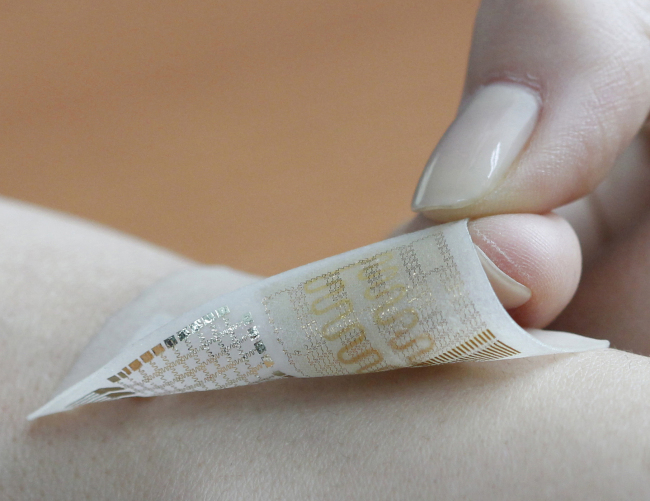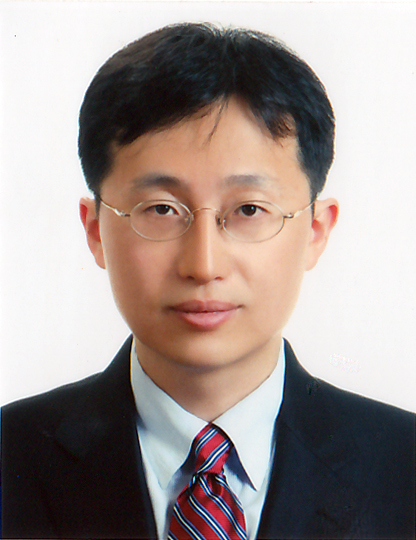▶삼성전자, LG전자 등 스마트 스킨 개발 착수
▶의료용 스마트 스킨 개발한 서울대 김대형 교수,다양한 종류의 스마트 스킨 출시 전망
지난 3월, 세계 최고 권위의 학술지인 네이처 나노테크놀로지에 서울대 김대형 교수와 연구원팀이 개발한 웨어러블 전자시스템에 대한 논문이 게재되어 국내외 이목을 집중시킨 바 있다.
논문의 주 저자인 김대형 교수는 최근 코리아헤럴드와의 인터뷰에서 “더 많은 질병을 모니터링 할 수 있는 웨어러블 기기를 연구하는 중”이라고 밝히며 의학용 웨어러블 기기 시장이 열릴 것으로 예측했다.
▶의료용 스마트 스킨 개발한 서울대 김대형 교수,다양한 종류의 스마트 스킨 출시 전망
지난 3월, 세계 최고 권위의 학술지인 네이처 나노테크놀로지에 서울대 김대형 교수와 연구원팀이 개발한 웨어러블 전자시스템에 대한 논문이 게재되어 국내외 이목을 집중시킨 바 있다.
논문의 주 저자인 김대형 교수는 최근 코리아헤럴드와의 인터뷰에서 “더 많은 질병을 모니터링 할 수 있는 웨어러블 기기를 연구하는 중”이라고 밝히며 의학용 웨어러블 기기 시장이 열릴 것으로 예측했다.

김 교수 연구팀이 발표한 의료용 웨어러블 전자기기는 파킨슨 병과 같은 행동장애가 있는 뇌 질환에 대한 실시간 모니터링이 가능하다. 또한 파키슨 병의 분석, 진단, 그리고 약물 투입까지 가능하다.
김 교수가 개발한 패치는 파킨슨 병의 흔한 증상인 떨림의 정도를 감지하고 떨림의 정도에 따라 약물의 투입 양을 달리할 수 있다.
환자의 떨림이 심해지면 패치 내의 히터가 온도를 높여 패치에 있는 약물을 녹이고 평소보다 많은 약물을 피부에 침투하게 만든다. 반대로 떨림의 정도가 약하면 온도가 자동으로 낮춰져 주입되는 약물의 양이 줄어든다.
이 기술을 사용하면 약물 과다 주입 시 생기는 부작용을 막을 수 있고, 약물이 너무 적게 주입되는 경우를 사전에 예방할 수 있다.
김 교수는 이 패치 형 기기에 대해 “파킨슨 병 등의 행동장애 뇌 질환 치료에 도움이 될 것”이라고 말했다.

하지만 이번에 개발한 패치는 성능이 더 개선되어야 하고, 인허가 과정도 오래 걸릴 것이 예상되기 때문에 상용화 시기는 최소 2~3년이 걸릴 수도 있을 것으로 예상되고 있다.
한편, 삼성전자, LG전자 등의 국내 기업들도 최근 스마트 스킨 개발에 착수 한 것으로 알려져 개발 속도 및 상용화 시기가 더 빨라 질 수도 있을 것으로 예상되고 있다.
(코리아헤럴드 김영원 기자)
<관련 영문 기사>
‘Smart skin’ may keep the doctor away
Samsung and LG seek to commercialize ‘smart skins’ developed by Korean researchers for treating Parkinson‘s
A team of Korean researchers have given new meaning to wearable devices with their development of a “smart skin” -- a medical patch applied to the skin capable of monitoring Parkinson’s disease.
The patch can also read body movements, and even administer drugs to a patient wearing it.
“The medical patch we developed can monitor patients with Parkinson’s disease and dose them automatically with drugs based on the level of their illness,” said Kim Dae-Hyeong, professor at Seoul National University’s school of chemical and biological engineering.
“The amount of drugs dispensed varies according to the severity of patients’ condition in order to prevent an overdose,” he added.
The smart skin was created with the short-term goal of more effectively treating the disease, but in the longer term, it might work to treat other brain dysfunctions.
Kim first came up with an idea for a dermal sensor for monitoring Parkinson’s in 2012, and released a publication about the smart skin patch in Science, an international science magazine.
The smart patch is fitted with a monitoring sensor, a type of computer memory called resistive random-access memory, and stretchable heaters. The bottom of the patch is coated with silica nanoparticles that contain drugs.
The monitoring sensor picks up signals caused by a patient’s tremors, and the heater embedded within the wearable patch warms up to eventually separate the drugs from the nanoparticles to be dissolved into the skin.
“I think that the latest smart patch, when fully developed, will be able to help those who suffer from behavioral disorders and other movement disorders,” the professor said.
He said it would take at least several more years to commercialize the patch, but with tech giants’ involvement, it may take less.
Samsung Electronics and LG Electronics are currently said to be working on smart skin products, meaning the patches may reach the public sooner than expected.
Kim said he would try to make a smart patch that could be powered by flexible batteries, with a wireless connection that can connect it to smartphones and other devices.
The researcher is also currently conducting research to develop other types of smart skin products that can monitor and diagnose other diseases.
International Data Corporation, a global research institute, forecasted in its April report that shipments of wearable devices including smart watches and smart bands would exceed 19 million in 2014 and increase to 111.9 million units in 2018.
Kim was picked as one of the world’s 35 young innovators who will change the world with innovation by Technology Review, published by Massachusetts Institute of Technology in 2011.
By Kim Young-won
(wone0102@heraldcorp.com)


![[AtoZ into Korean mind] Humor in Korea: Navigating the line between what's funny and not](http://res.heraldm.com/phpwas/restmb_idxmake.php?idx=644&simg=/content/image/2024/04/22/20240422050642_0.jpg&u=)
![[Exclusive] Korean military set to ban iPhones over 'security' concerns](http://res.heraldm.com/phpwas/restmb_idxmake.php?idx=644&simg=/content/image/2024/04/23/20240423050599_0.jpg&u=20240423183955)


![[Graphic News] 77% of young Koreans still financially dependent](http://res.heraldm.com/phpwas/restmb_idxmake.php?idx=644&simg=/content/image/2024/04/22/20240422050762_0.gif&u=)

![[Herald Interview] Why Toss invited hackers to penetrate its system](http://res.heraldm.com/phpwas/restmb_idxmake.php?idx=644&simg=/content/image/2024/04/22/20240422050569_0.jpg&u=20240422150649)





![[Exclusive] Korean military to ban iPhones over security issues](http://res.heraldm.com/phpwas/restmb_idxmake.php?idx=652&simg=/content/image/2024/04/23/20240423050599_0.jpg&u=20240423183955)



![[Today’s K-pop] Ateez confirms US tour details](http://res.heraldm.com/phpwas/restmb_idxmake.php?idx=642&simg=/content/image/2024/04/23/20240423050700_0.jpg&u=)